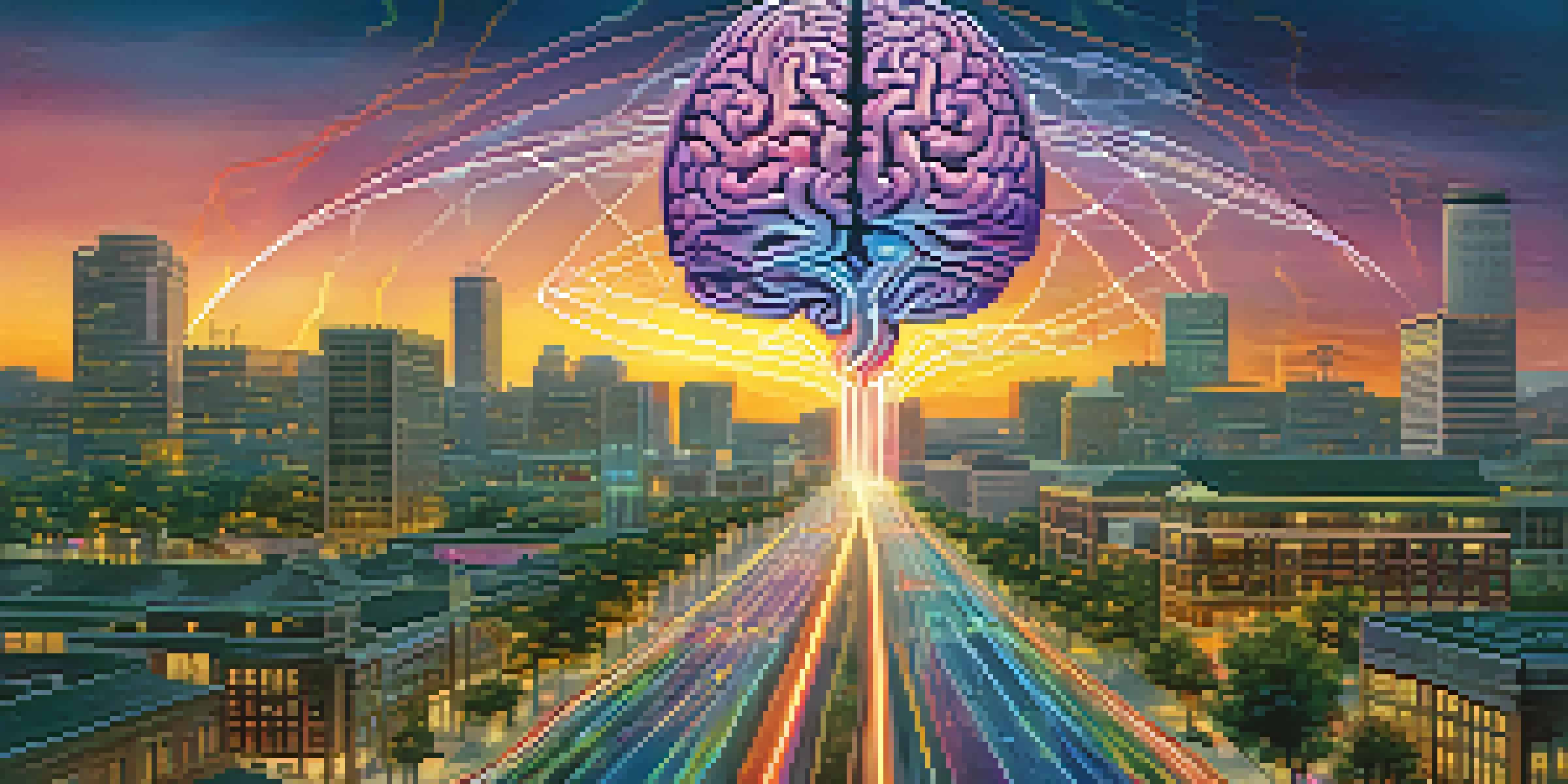Neuroplasticity: The Brain's Adaptability in Addiction Recovery

Understanding Neuroplasticity: The Brain's Flexibility
Neuroplasticity refers to the brain's remarkable ability to reorganize itself by forming new neural connections throughout life. This means that our brains are not static; they can adapt and change based on our experiences, learning, and even our environment. For individuals recovering from addiction, this ability plays a crucial role in reshaping thought patterns and behaviors that may have contributed to their substance use.
Neuroplasticity is the brain's ability to reorganize itself by forming new neural connections throughout life.
Imagine your brain as a bustling city with numerous roads and pathways. When someone develops an addiction, certain routes become heavily trafficked, often leading to destructive behaviors. However, through neuroplasticity, the brain can create new pathways, allowing for healthier choices and responses to triggers.
This adaptability is a key factor in recovery, as it empowers individuals to replace old habits with new, positive ones, essentially reprogramming their responses to cravings and stressors.
The Science Behind Neuroplasticity in Addiction Recovery
At the core of neuroplasticity are neurons, the brain's building blocks that communicate with one another. When someone engages in a behavior repeatedly, such as substance use, the connections between these neurons strengthen, making that behavior more automatic. However, through intentional practice and therapeutic interventions, new connections can be formed, diminishing the power of those old habits.

Research shows that activities like cognitive behavioral therapy (CBT), mindfulness, and even physical exercise can enhance neuroplasticity. These activities encourage the brain to adapt by creating new neural pathways, which can help individuals develop healthier coping mechanisms. It's like giving your brain a workout, helping it to become more resilient and flexible.
Neuroplasticity and Recovery
Neuroplasticity enables the brain to reorganize itself, allowing individuals in recovery to form new, healthier habits.
In this way, understanding the science behind neuroplasticity helps addiction recovery specialists design more effective treatment plans that leverage the brain's natural ability to change and adapt.
The Role of Therapy in Enhancing Neuroplasticity
Therapy plays a pivotal role in harnessing neuroplasticity for addiction recovery. Therapists often use evidence-based methods that encourage patients to explore their thoughts, emotions, and behaviors related to their addiction. This exploration can lead to insights that promote new ways of thinking and acting, crucial in breaking the cycle of addiction.
The mind is a wonderful servant but a terrible master.
For instance, cognitive behavioral therapy (CBT) helps individuals identify and challenge negative thought patterns, replacing them with more constructive ones. This process not only aids in recovery but actively stimulates the brain's ability to form new connections, reinforcing healthier habits.
By participating in regular therapy, individuals can create a supportive environment conducive to neuroplastic change, fostering growth and healing throughout their recovery journey.
Mindfulness and Its Impact on Neuroplasticity
Mindfulness practices, such as meditation and deep-breathing exercises, have gained popularity in addiction recovery due to their positive impact on neuroplasticity. These practices help individuals develop greater awareness of their thoughts and feelings, reducing impulsive reactions that can lead to relapse. In essence, mindfulness acts as a mental reset button, allowing the brain to focus on the present rather than being caught in a cycle of cravings.
Research indicates that mindfulness can lead to structural changes in the brain, particularly in areas responsible for self-regulation and emotional control. By regularly engaging in mindfulness exercises, individuals can strengthen these areas, making it easier to navigate challenges and triggers in their recovery process.
Therapy Enhances Neuroplasticity
Therapeutic interventions, such as cognitive behavioral therapy, actively stimulate the brain's ability to forge new connections essential for overcoming addiction.
Incorporating mindfulness into a recovery plan not only nurtures mental well-being but also actively promotes neuroplasticity, creating a healthier, more adaptable brain.
The Power of Social Connections in Recovery
Social connections are vital for anyone recovering from addiction, as they provide support, encouragement, and accountability. Engaging with others who share similar experiences can help individuals feel less isolated, fostering a sense of belonging. These connections can also stimulate neuroplasticity by exposing the brain to new perspectives and experiences.
Support groups, such as Alcoholics Anonymous (AA) or Narcotics Anonymous (NA), create safe spaces where individuals can share their struggles and successes. This communal aspect not only reinforces positive behaviors but also encourages the brain to adapt and grow in response to social interactions.
Building a strong support network can significantly enhance recovery outcomes, as it taps into the brain's ability to learn from relationships and experiences, promoting lasting change.
Nutrition and Its Role in Supporting Neuroplasticity
Nutrition plays a crucial role in brain health, directly influencing neuroplasticity. A balanced diet rich in vitamins, minerals, and healthy fats can provide the necessary nutrients for optimal brain function. Foods high in omega-3 fatty acids, antioxidants, and B vitamins have been linked to improved cognitive function and neuroplasticity.
For individuals in recovery, adopting a nutritious diet can support the brain's healing process by enhancing its ability to form new connections. Think of it as giving your brain the right fuel to perform at its best. Incorporating whole foods, such as leafy greens, fish, nuts, and berries, can lay the foundation for a healthier brain.
Nutrition Supports Brain Health
A balanced diet rich in nutrients can enhance neuroplasticity, providing the brain with the fuel it needs to adapt and heal during recovery.
By prioritizing nutrition as part of a comprehensive recovery plan, individuals can not only improve their physical health but also boost their brain's adaptability, enhancing their chances of long-term success.
Embracing Change: The Journey of Recovery
Recovery is inherently a journey of change, and embracing neuroplasticity can make this journey more manageable and rewarding. As individuals work to overcome addiction, they will encounter challenges, setbacks, and successes. Understanding that the brain has the ability to adapt and grow can provide a sense of hope and empowerment throughout this process.
Each step taken towards recovery—whether through therapy, mindfulness, social connections, or nutrition—contributes to the brain's ability to rewire itself. It's essential to celebrate these small victories, as they signify progress and reinforce new, healthier pathways.

Ultimately, recognizing the brain's adaptability can inspire individuals to commit to their recovery, knowing that change is not only possible but also a natural part of their healing journey.